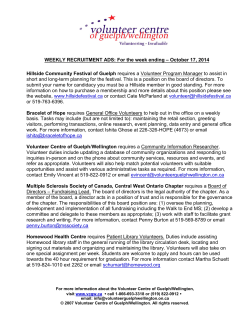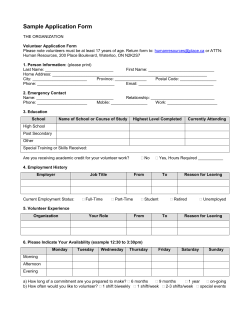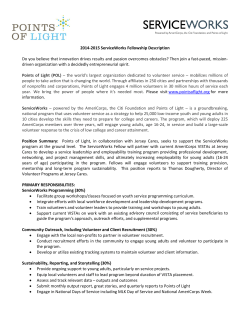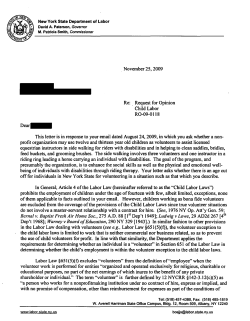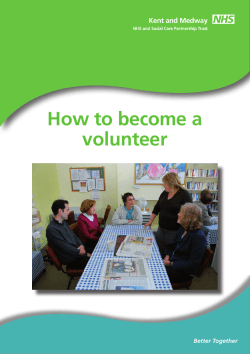
Document 451020
UN YOUTH VOLUNTEER DESCRIPTION OF ASSIGNMENT Preamble: The United Nations Volunteers (UNV) programme is the UN organization that promotes volunteerism to support peace and development worldwide. Volunteerism can transform the pace and nature of development and it benefits both society at large and the individual volunteer. UNV contributes to peace and development by advocating for volunteerism globally, encouraging partners to integrate volunteerism into development programming, and mobilizing volunteers. In most cultures volunteerism is deeply embedded in long-established, ancient traditions of sharing and support within the communities. In this context, UN Youth Volunteers take part in various forms of volunteerism and play a role in development and peace together with co-workers, host agencies and local communities. In all assignments, UN Youth Volunteers promote volunteerism through their action and conduct. Engaging in volunteer activity can effectively and positively enrich their understanding of local and social realities, as well as create a bridge between themselves and the people in their host community. This will make the time they spend as UN Volunteers even more rewarding and productive. 1. UNV Assignment Title: International UN Youth Volunteer Vulnerability (VAM) Officer 2. Type of Assignment: International UN Youth Volunteer 3. Project Title: Strengthening Food Security Analysis and Monitoring in Namibia 4. Duration: 12 months 5. Location, Country: Namibia 6. Expected Starting Date: 15 January 2015 7. Brief Project Description: Analysis and Mapping Food Security Analysis, Vulnerability assessment, Strengthening Technical Capacity 8. Host Agency/Host Institute: WFP 9. Organizational Context: The Government of Namibia supported by the World Food Programme (WFP), is working towards strengthening food and nutrition security monitoring in order to inform decision makers of impending food needs at national and local levels. Namibia’s response to food needs resulting from the negative effects of recurring natural disasters and other shocks has been slow and sometimes inadequate. This is partly attributed to weak early warning systems and inadequate links between the information generated by existing systems and the policy making process. Although Namibia has a number of early warning systems that collect information on food security indicators, most of these systems focus on macro-level information and are not operational at the sub-national level. Most existing information systems work in isolation from one another none of the food security information products provide holistic or integrated analysis of food security conditions in the country. The recent drought emergency in Namibia revealed gaps in food security information and highlighted the need for a functional monitoring system that is fully integrated into the decision making processes of the government. In 2013, a Cabinet resolution approved the establishment of a Food Security Monitoring System in order to track changes in people's food security situation and alert stakeholders when a situation deteriorates so that timely and appropriate response options can be implemented. Since September 2013, WFP has been providing technical assistance to the Namibian Vulnerability Assessment Committee (NamVAC) to develop a system to collect information on individual households' food consumption, their income and the strategies they use to cope with stressful situations. This system is being designed to also monitor market prices, rainfall patterns and other key indicators using a combination of primary and secondary data collection tools. To enhance food security monitoring at household level, 100 sentinel sites from where primary data will be collected on a quarterly basis, have been established across the country. The decentralisation of the food security monitoring process to the regional level is expected to empower the Regional Councils as key stakeholders in food security analysis and programming. 10. Type of Assignment Place: Assignment without family 11. Description of tasks: Strengthen government capacity to plan and conduct Food Security Monitoring (FSM) and when required, participate in the emergency needs assessments and support government operational planning. With technical guidance from the RB, contribute to the development of the FSM plan, participate in the preparation, implementation and analysis of data resulting from Food Security Monitoring Systems (FSMS) in support of WFP Country Offices and the Directorate of Disaster Risk Management (DDRM); Actively prepare and support the CO in developing a donor funding proposal for technical assistance on food security monitoring Participate in the preparation of FSM report and participate in the presentation of results when required. Participate in food security and vulnerability assessments and monitoring as well as other joint assessments; and assist government to analyse geographic patterns of food insecurity and vulnerability by integrating primary food security data with other sources of data in the Geography Information Systems (GIS) environment; Transfer skills and develop sustainable capacity in food security analysis and information management systems in relevant government institutions and local partners; Perform other related duties as required. 12. Results/Expected Output: Regular FSM surveys conducted 100 FSM enumerators from sentinel sites trained Regular training material prepared/reviewed FSM Data analysed in a timely manner Consultation meetings with FSM stakeholders organized to discuss assessments results Quarterly food security bulletins, annual technical reports and regular concept notes prepared 13. Qualifications/Requirements: Academic; Minimum Master’s degree in Food security studies, development studies; Demonstrated interest and/or experience in: food security assessments, vulnerability analysis and mapping or related fields; Functional Competencies: Knowledge Management and Learning Shares knowledge and experience Actively works towards continuing personal learning, acts on learning plan and applies newly acquired skills Development and Operational Effectiveness Ability to perform a variety of standard tasks related to Results Management, including support to design, planning and implementation of projects, managing data, reporting Ability to furnish official correspondences, meeting minutes and various short write-ups Proven organizational skills to file and keep track of all project related official documents. Inter-personal skills with people at all levels Proven ability to organize multiple tasks simultaneously to meet deadlines Leadership and Self-Management Focuses on result for the partners and responds positively to feedback Consistently approaches work with energy and a positive, constructive attitude Remains calm, in control and good humored even under pressure Good interpersonal, networking and communication skills; Willingness to learn and contribute and work as part of a team; Respect for diversity and adaptability to other cultures, environments and living conditions; Fluency in spoken and written in English language is a requirement Previous experience as a volunteer and/or experience of another culture, (i.e. studies, volunteer work, internship) would be highly regarded; Computer skills (i.e. Word, Excel, PowerPoint, social media, and spreadsheet database) 14. Learning expectations Learning and development are a central part of the UN Youth Volunteer’s assignment and take place before, during and after his or her assignment in the field. Ideally, offering diverse opportunities for learning and development aim to strengthen the volunteer’s skills and competences, improve the quality of the assignment and keep the volunteer’s motivation high. Learning elements for the UN Youth Volunteer include the development of: Professional skills: including specific competencies and reflection on assignment-related abilities; and on-the-job skills such as time management, problem solving, team building; and career preparedness such as interview skills, CV preparation, job searching. Inter-personal skills: including communication and listening skills; multi-cultural awareness and cultural competency; and conflict and stress management. Volunteering-related skills: including leadership; civic responsibility; and engagement and active participation. Beyond the learning opportunities provided by UNV, host agencies are expected to support knowledge and capacity development in the technical areas that are relevant to the UN Youth Volunteer’s assignment. Host agencies are also expected to provide, at their expense, UN Youth Volunteers with equal opportunity to participate in training courses and workshops offered to the host agency’s personnel. Furthermore, the UN Youth Volunteer is encouraged to: Strengthen the knowledge and understanding of the concept of volunteerism by reading relevant UNV and external publications and taking active part in UNV events. Be acquainted with and build on traditional and/or local forms of volunteerism in the country; Reflect on the type and quality of voluntary action that they are undertaking, including participation in ongoing reflection activities; Contribute articles/write-ups on volunteering experiences and submit them to the team at UNVHQs for consideration (beyond other communications responsibilities), and input to the UNV publications/websites, newsletters, press releases, etc.; Assist with the UNV Buddy Programme for newly-arrived UN Youth Volunteers; Promote or advise local groups in the use of online volunteering, or encourage relevant local individuals and organizations to use the UNV Online Volunteering service. 15. Living Conditions: Windhoek is a relatively safe duty station classified as an A duty station. Support is generally provided to help find accommodation nearby the office. 16. Conditions of Service A 12 - months contract; monthly volunteer living allowance (VLA) intended to cover housing, basic needs and utilities, equivalent to US$1555.20; settling-in-grant US$1555.20. (Once off beginning of the initial contract; life, health, and permanent disability insurance; resettlement allowance for satisfactory service. 17. How to apply: This modality aims to mobilize Youth between 18 and 29 years old. If you are not a candidate in the UNV database, please apply by registering your profile through the following link: http://ereta.unv.org/html/index.php?module=myprofile&ad=YTH14NAM000219. Important: Once you have created your UNV account and after validating your email address, please complete all sections of your profile and make sure the correct advertisement code ‘YTH14NAM000219’ is selected in the ‘Special Recruitment’ tab of MyProfile. Your application can only be considered once you have clicked on the green ‘Submit My Profile’ button. As a confirmation of your successful registration, you will receive an email with your UNV roster number. If you already are a candidate in the UNV database, please update your profile through: http://MyProfile.unv.org and select the code ‘YTH14NAM000219’ from the drop down list in the ‘Special Recruitment’ tab. Closing date: Profiles of interested applicants must be fully registered in the UNV database of candidates not later than 04 December 2014 (applications received after that date will not be taken into consideration). Only shortlisted candidates will be contacted. The UNV programme is committed to achieving diversity in terms of gender, nationality and culture.
© Copyright 2025


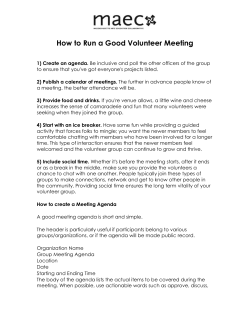

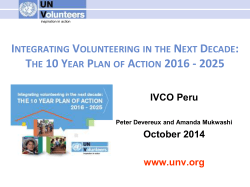
![発表資料(東洋大学橋本工) [PDFファイル]](http://cdn1.abcdocz.com/store/data/000821790_1-f7630413117a07a3702c79f4129fbca8-250x500.png)
